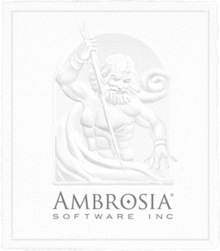Ambrosia Software
 | |
| Private | |
| Industry | Software, video games |
| Founded | August 18, 1993 |
| Headquarters | Rochester, New York, U.S. |
Key people | Andrew Welch |
| Products | Shareware video games and utilities |
| Website |
www |
Ambrosia Software is a predominantly Macintosh software company located in Rochester, New York, U.S. Ambrosia produces utility software and video games. Its products are distributed as shareware; demo versions can be downloaded and used for up to 30 days.
Ambrosia's best-selling program is the utility Snapz Pro X,[1] according to a 2002 interview with company president Andrew Welch, although the company is better known for the production and the distribution of video games.
History
Ambrosia Software was incorporated August 18, 1993 by Welch after he graduated from the Rochester Institute of Technology in 1992.[2] The first game produced by Ambrosia was Maelstrom, a 1992 remake of the 1979 Asteroids arcade game. Maelstrom won a number of software awards.[3] This initial success led Ambrosia to release several more arcade-style games, including Apeiron (a remake of Centipede), Swoop (a clone of Galaxian), and Barrack (a clone of JezzBall). In 1999, Cameron Crotty of Macworld wrote "No other company has gotten so much mileage out of renovating mid-1980s arcade hits."[4]
At least half of the company's ten employees were laid off in 2013, but Welch denied rumors of the company shutting down.[5]
Products
Games
Ambrosia Software's games, in order of release:
- Maelstrom — Asteroids remake
- Chiral
- Apeiron — Centipede remake
- Swoop — Galaxian clone
- Barrack — JezzBall clone[6]
- Escape Velocity
- Avara
- Bubble Trouble
- Harry the Handsome Executive
- Mars Rising
- EV Override
- Slithereens
- Cythera
- Ares
- Ferazel's Wand
- Pillars of Garendall
- Deimos Rising
- Coldstone game engine
- Escape Velocity Nova
- Bubble Trouble X — Mac OS X port of original, with minor gameplay changes
- pop-pop
- Uplink — Mac OS X port
- Aki
- Apeiron X — Mac OS X port of the original, with enhanced graphics
- GooBall
- Darwinia — Mac OS X port
- El Ballo
- Redline
- SketchFighter 4000 Alpha
- DEFCON — Mac OS X port
- pop-pop — Universal Binary release
- Uplink — Universal Binary release
- Aki — Universal Binary release
- Mondo Solitaire
- Aki — iPhone/iPod Touch release
- Aquaria — Mac OS X port
- Escape Velocity Nova — Universal Binary release
- Multiwinia — Mac OS X port
- Hypnoblocks
Ambrosia, in conjunction with DG Associates, has also released the Escape Velocity Nova Card Game.
Productivity Software
Ambrosia Software's utilities, in order of release:
- Eclipse — Screen saver CDEV
- Big Cheese Key — FKey to mask screen image from boss.
- FlashWrite — Text editor Desk Accessory
- FlashWrite ][
- ColorSwitch — Menu bar item to change monitor color depth
- EasyEnvelopes — Envelope printing Desk accessory. Later a Mac OS X v10.4 and Mac OS X v10.5 Dashboard widget.
- Snapz
- To Do!
- Oracle
- ColorSwitch Pro
- Snapz Pro— Screen capture application
- iSeek — Desktop search application
- Snapz Pro X — Mac OS X-compatible version of original
- WireTap Pro — Audio recording utility
- Screen Cleaner Pro — April Fool's joke
- Dragster — File transfer application
- iToner — iPhone custom ringtone transfer utility
- WireTap Studio — Audio recording, editing and master storage; won a 2007 "Eddy Award" from Macworld
- WireTap Anywhere — professional virtual audio patchbay utility, enabling the recording of any Mac OS X application's audio output from within any Mac OS X audio application.
- Soundboard — Mac OS X Audio playback ("computerized cart machine")
- Big Cheese Key X — Mac OS X-compatible version of original
No "Crippled" shareware
One of Ambrosia's founding mantras was that shareware software should not be distributed as crippleware. The company's software was released on the honor system with only a short reminder that you had used the unregistered software for "x" amount of time, creating what is commonly called nagware.[7] This policy has since been changed and the company today employs typical shareware piracy prevention measures,[8] as well as more innovative ones such as used in the Escape Velocity line of games where Hector the Parrot will use her heavily armed frigate to attack players of unregistered copies after the trial period has expired. Their software products now fall under the category of crippleware.[8] Matt Slot has written about the factors that played into the policy change.[7]
Reception
| Reception | ||||||
|---|---|---|---|---|---|---|
| ||||||
Macworld's Michael Gowan praised Ambrosia's game Mars Rising.[9]
References
- ↑ "MacSlash Interview: Andrew Welch of Ambrosia". MacSlash (retrieved from the Internet Archive). 2002-01-23. Archived from the original on 2007-12-31. Retrieved 2011-04-28.
- ↑ "Home-grown Ambrosia feeds software niche", Michael Saffran. In RIT: The University Magazine, Vol. 10, #1
- ↑ "Into the Maelstrom". The Mac Observer. 1999-12-08. Archived from the original on 8 June 2011. Retrieved 2011-04-28.
- ↑ Crotty, Cameron (January 1999). "Mars Rising". Macworld.
- ↑ Mathis, Joel. "Despite layoffs, Ambrosia says it's still in business". Macworld.
- ↑ Salvador, Phil. "Barrack". The Obscuritory.
- 1 2 Gowan, Michael (February 1999). "Name Your Game; From Goofy to Gory, Macworld Reviews 48 Ways to Play". Macworld. Archived from the original on August 10, 2001.